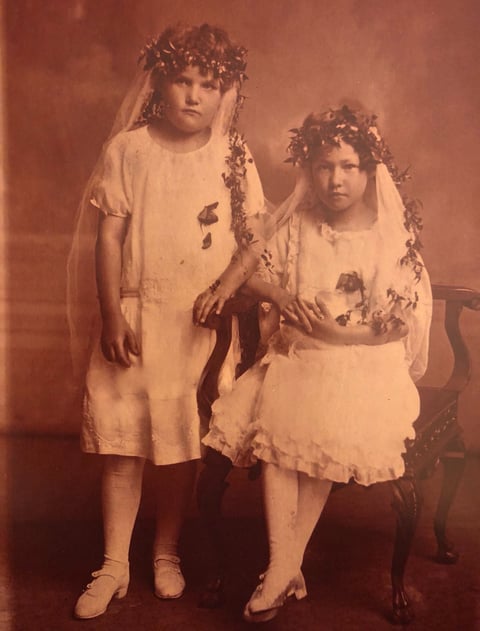The Emotional and Practical Value of Preserving Family Stories
Preserving family stories is more than a nostalgic pastime—it’s a way to strengthen family bonds, honor your heritage, and create a lasting legacy for future generations. In this post, we explore the emotional benefits of family storytelling, like fostering connection and identity, and the practical advantages, such as documenting history and simplifying estate planning. Learn how videos, photos, and written records can help you safeguard your family’s unique history and start preserving your stories today.
Dawn Tyrrell
1/11/20255 min read


The Emotional and Practical Value of Preserving Family Stories
Have you ever sat around a dinner table, listening to an elder recount a story about "the old days"? Maybe it was about how they met the love of their life or how they navigated a world so different—and yet so similar—to the one we know today. Stories like these do more than entertain us. They ground us. They remind us who we are, where we came from, and what really matters.
In the rush of modern life, it’s easy to let these moments slip away, thinking there will always be time to ask or record them later. But preserving family stories is a gift—one that connects the past, enriches the present, and lights the way forward for future generations. Whether it’s through photos, videos, or written memories, preserving these moments allows us to honor our roots, cherish today, and leave something meaningful behind.
Let’s take a deeper look at why preserving family stories matters—not just for sentimental reasons, but for the emotional comfort, connection, and even practical benefits they bring.
Why Family Stories Matter
Every family has a story. It’s in the laughter shared over old photo albums, the tears shed over a loved one’s memory, and the quiet pride felt when hearing tales of perseverance. These stories are more than just words—they’re the threads that stitch generations together.
1. They Strengthen Bonds Across Generations
When we share family stories, we build bridges between the past and the present. For younger family members, hearing about their great-grandparents’ lives can bring history to life in a way no textbook ever could. For older generations, sharing their experiences can feel like passing the torch—a chance to be seen, valued, and remembered.
Imagine this: a great-grandparent sits down with their grandchild to describe what it was like growing up during the Great Depression. As they talk, the child begins to see the strength and resilience woven into their family’s DNA. That’s not just a history lesson—it’s a connection, a legacy, and a source of pride.
Or picture this: a narrated slideshow from a past family reunion plays at the next gathering. Laughter echoes as everyone points out familiar faces and relives the joy of that day. Stories like these aren’t just about the past—they bring families closer together in the present, too.
2. They Offer Comfort in Hard Times
In moments of loss or difficulty, family stories have a way of reminding us we’re not alone. They show us that others have faced challenges, endured heartbreak, and come out stronger.
Listening to stories about how a loved one overcame their struggles can be a balm during tough times. It’s as if they’re whispering to us, “You’ve got this. We’ve been there, too.” And watching an old video of a late family member—their voice, their smile, their gestures—can feel like being wrapped in a warm hug from the past.
By preserving these memories, we hold onto the wisdom, love, and resilience of those who came before us, carrying their strength with us when we need it most.
3. They Shape Our Sense of Identity
Who we are is deeply tied to where we come from. Family stories bring this into focus. They highlight the values, traditions, and experiences that make your family uniquely yours.
Take, for instance, a video of a family elder recounting the story of immigrating to a new country. It’s not just a story of bravery and determination—it’s a reminder to younger generations of the courage that runs through their veins. Or think about a photo book documenting decades of family milestones, from weddings to graduations. These moments don’t just preserve memories; they reflect the qualities—love, perseverance, loyalty—that define your family.
When we preserve these stories, we’re not just saving memories. We’re safeguarding a sense of belonging and pride that can guide future generations.
The Practical Side of Family Stories
While the emotional benefits of preserving family stories are profound, there’s also a practical side to consider. Your family’s stories are a treasure trove of history and knowledge, but they’re also a resource that can make life a little easier.
1. They’re a Piece of History
Every family’s story is a small but important thread in the fabric of history. Photos, videos, and letters often reveal unique perspectives on world events—moments that textbooks may never capture.
Imagine a narrated slideshow of a WWII veteran recounting their experiences. It’s more than a family heirloom; it’s a window into a moment in time. Or consider a collection of journals and letters chronicling how your family lived through the Civil Rights Movement or an immigration journey. Preserving these pieces ensures your family’s voice is part of the broader story of history.
2. They Simplify Legal and Practical Matters
Family records, such as photos and documents, aren’t just sentimental—they can be vital. Birth certificates, marriage licenses, and even old property deeds often come in handy for navigating legal and financial situations.
Digitizing these records can make a world of difference when settling estates, tracing ancestry, or even managing healthcare. For instance, having photos or documentation of family medical histories can be invaluable when consulting with doctors.
3. They Make Estate Planning Easier
Preserving family stories can add clarity and meaning to estate planning. A video message from a grandparent sharing their wishes or advice can provide guidance and comfort to their heirs. Organizing photos and records can ensure that sentimental items are preserved in ways that honor the family’s intentions.
By taking the time to preserve stories and records now, families can reduce stress and confusion later—and ensure that the legacy they leave behind is one of love and clarity.
How to Start Preserving Family Stories
Preserving your family’s stories might feel overwhelming, but it doesn’t have to be. Start small:
Sit down with a family elder and ask them about their life.
Scan a few old photos and label them with names and dates.
Create a simple slideshow using your favorite family pictures.
For those who want to go further, professional services can help make the process seamless. At Memento & Co., we specialize in helping families organize, digitize, and preserve their photos, videos, and stories. Whether you want to create a narrated slideshow or capture a loved one’s story on video, we’re here to help you safeguard your family’s legacy.
A Legacy Worth Preserving
Preserving family stories isn’t just about nostalgia—it’s about building a bridge between generations, offering comfort, and creating a shared sense of identity. It’s about honoring those who came before us, celebrating the love we share today, and leaving something meaningful for the future.
Start preserving your family’s stories today—because every story matters, and the best time to begin is now.








Ready to Begin?
Let’s Get Started on Preserving Your Legacy
